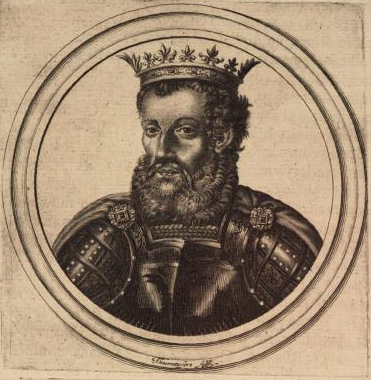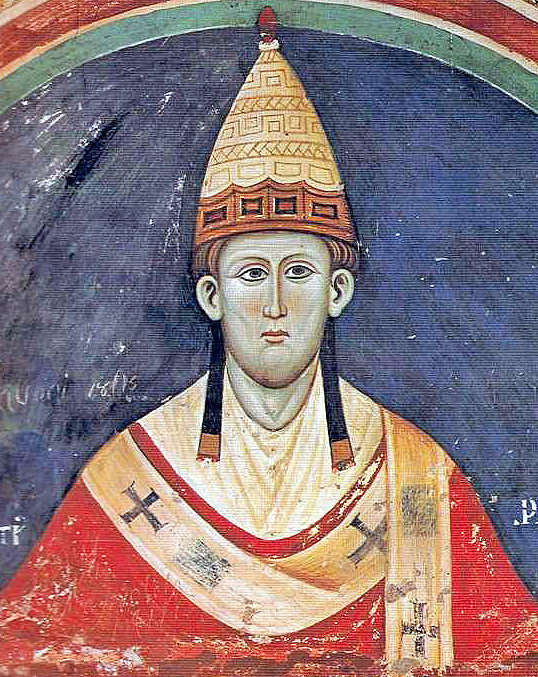|
Berthold Of Hanover
Berthold of Hanover (died 24 July 1198) was a German Cistercian and Bishop of Livonia, who met his death in a crusade against the pagan Livonians. Life He was Abbot of the Cistercian monastery of Lockum in Hanover. At the death of Saint Meinhard, the first Bishop of Livonia (c. 1196), Hartwig of Uthlede, Archbishop of Bremen, to whose province belonged the newly converted countries along the eastern shores of the Baltic Sea, appointed Abbot Berthold successor. Damberger asserts that when Meinhard came to Bremen in 1186 to obtain help with his mission in Livonia, Berthold joined the band of missionaries who accompanied him there. The Livonian pagans were fanatically opposed to Christianity. Berthold's predecessor, assisted by merchants from Bremen and Lübeck and a few converts, had built fortifications along the River Düna, where Christians held their religious services and could protect themselves. Following in the footsteps of his predecessor, Berthold tried to gain confid ... [...More Info...] [...Related Items...] OR: [Wikipedia] [Google] [Baidu] |
Bertold
Bertold may refer to: Given name *Bertold Brühaven, Teutonic knight from the then Duchy of Austria, Komtur of Königsberg from 1289 to 1302 *Bertold Eisner (1875–1956), Croatian Jewish law professor at the University of Zagreb *Bertold Hummel (1925–2002), German composer of modern classical music *Bertold Löffler (1874–1960), Austrian painter, printmaker, and designer *Bertold Mainka (born 1934), Polish rower *Bertold Popovics (born 1991), Hungarian midfielder *Bertold Posselt, Austrian luger who competed in the early 1910s *Bertold of Regensburg (1220–1272), German preacher during the high Middle Ages *Bertold Reissig (born 1877), German stage and film actor *Bertold Wiesner FRSE (1901–1972), Austrian Jewish physiologist Surname *Isabella Bertold (born 1991), Canadian sailor and cyclist See also *Berthold (other) * Bertholds (other) * Bertol (other) * Bertoldi *Bertoldo ''Bertoldo'' was a biweekly magazine of surreal humour that ran from 1 ... [...More Info...] [...Related Items...] OR: [Wikipedia] [Google] [Baidu] |
Pope Innocent III
Pope Innocent III ( la, Innocentius III; 1160 or 1161 – 16 July 1216), born Lotario dei Conti di Segni (anglicized as Lothar of Segni), was the head of the Catholic Church and ruler of the Papal States from 8 January 1198 to his death in 16 July 1216. Pope Innocent was one of the most powerful and influential of the medieval popes. He exerted a wide influence over the Christian states of Europe, claiming supremacy over all of Europe's kings. He was central in supporting the Catholic Church's reforms of ecclesiastical affairs through his decretals and the Fourth Lateran Council. This resulted in a considerable refinement of Western canon law. He is furthermore notable for using interdict and other censures to compel princes to obey his decisions, although these measures were not uniformly successful. Innocent greatly extended the scope of the Crusades, directing crusades against Muslim Iberia and the Holy Land as well as the Albigensian Crusade against the Cathars in southern ... [...More Info...] [...Related Items...] OR: [Wikipedia] [Google] [Baidu] |
German Cistercians
German(s) may refer to: * Germany (of or related to) **Germania (historical use) * Germans, citizens of Germany, people of German ancestry, or native speakers of the German language ** For citizens of Germany, see also German nationality law **Germanic peoples (Roman times) * German language **any of the Germanic languages * German cuisine, traditional foods of Germany People * German (given name) * German (surname) * Germán, a Spanish name Places * German (parish), Isle of Man * German, Albania, or Gërmej * German, Bulgaria * German, Iran * German, North Macedonia * German, New York, U.S. * Agios Germanos, Greece Other uses * German (mythology), a South Slavic mythological being * Germans (band), a Canadian rock band * "German" (song), a 2019 song by No Money Enterprise * ''The German'', a 2008 short film * "The Germans", an episode of ''Fawlty Towers'' * ''The German'', a nickname for Congolese rebel André Kisase Ngandu See also * Germanic (other) * German ... [...More Info...] [...Related Items...] OR: [Wikipedia] [Google] [Baidu] |
1198 Deaths
Year 1198 ( MCXCVIII) was a common year starting on Thursday (link will display the full calendar) of the Julian calendar. Events By place Europe * March 8 – Philip of Swabia, son of the late Emperor Frederick I, is elected "King of Germany" by his supporters at Mühlhausen in Thuringia. Archbishop Adolf of Cologne elects Otto of Brunswick, son of Henry the Lion, as Philip's rival. Otto IV is crowned as King of the Romans in Aachen by supporters of the House of Welf. Philip's coronation does not take place until September 8, at Mainz. * May 17 – Frederick II, infant son of the late Emperor Henry VI, is crowned King of Sicily. His mother, Queen Constance I becomes regent, while she surrounds herself with local advisors. On November 27, Constance dies in the royal palace at Palermo. She is succeeded by the new pope, Innocent III, who becomes Frederick's guardian and mentor. England * John of England captures a party of 18 French knights and man ... [...More Info...] [...Related Items...] OR: [Wikipedia] [Google] [Baidu] |
Kirchenlexikon
''Wetzer and Welte's Kirchenlexikon'' is an encyclopedic work of Catholic biography, history, and theology, first compiled by Heinrich Joseph Wetzer and Benedict Welte. The first edition in 12 volumes was published from 1847 to 1860, by Verlag Herder. Another edition, edited by Joseph Hergenröther and Franz Philip Kaulen and subtitled ''Encylopädie der katholischen Theologie und ihrer Hülfswissenschaften'', was published in Freiburg from 1882 through 1903. Bibliography * Holweck, F. G., ''A Biographical Dictionary of the Saints''. St. Louis, MO: B. Herder Book Co. 1924. References External links ''Monumenta Germaniae Historica''mirror of Google books Google Books (previously known as Google Book Search, Google Print, and by its code-name Project Ocean) is a service from Google Inc. that searches the full text of books and magazines that Google has scanned, converted to text using optical c ... digitalization Christian hagiography German books Biographies about ... [...More Info...] [...Related Items...] OR: [Wikipedia] [Google] [Baidu] |
Chronicle Of Henry Of Livonia
The ''Livonian Chronicle of Henry'' ( la, Heinrici Cronicon Lyvoniae) offers a Latin narrative of events in Livonia (roughly corresponding to today's inland Estonia and the northern part of Latvia) and surrounding areas from 1180 to 1227. It was written ca. 1229 by a priest named Henry ( la, Henricus de Lettis). Apart from the few references in the Primary Chronicle compiled in Kievan Rus' in the twelfth century, it is the oldest known written document about the history of Estonia and Latvia. Background Papal calls for renewed holy war at the end of the twelfth century inspired not only the disastrous Fourth Crusade that sacked Constantinople in 1204, but also a series of simultaneous "Northern Crusades" that are less fully covered in English-language popular history, but which were more successful in the long run. Before the crusades, the region of medieval Livonia was a mixed outpost, a mostly "pagan" society where merchants from the Hanseatic League encountered merchants of No ... [...More Info...] [...Related Items...] OR: [Wikipedia] [Google] [Baidu] |
Teutonic Order
The Order of Brothers of the German House of Saint Mary in Jerusalem, commonly known as the Teutonic Order, is a Catholic religious institution founded as a military society in Acre, Kingdom of Jerusalem. It was formed to aid Christians on their pilgrimages to the Holy Land and to establish hospitals. Its members have commonly been known as the Teutonic Knights, having a small voluntary and mercenary military membership, serving as a crusading military order for the protection of Christians in the Holy Land and the Baltics during the Middle Ages. Purely religious since 1810, the Teutonic Order still confers limited honorary knighthoods. The Bailiwick of Utrecht of the Teutonic Order, a Protestant chivalric order, is descended from the same medieval military order and also continues to award knighthoods and perform charitable work. Name The name of the Order of Brothers of the German House of Saint Mary in Jerusalem is in german: Orden der Brüder vom Deutschen Haus der He ... [...More Info...] [...Related Items...] OR: [Wikipedia] [Google] [Baidu] |
Livonian Brothers Of The Sword
german: Schwertbrüderordenfrench: Ordre des Chevaliers Porte-Glaive , image= , caption= , dates=1204–1237 , country= Terra Mariana , allegiance= Catholic Church , garrison= Wenden (Cēsis), Fellin (Viljandi), Segewold (Sigulda). Ascheraden (Aizkraukle), Goldingen (Kuldīga), Marienburg (Alūksne), Reval (Tallinn), Weißenstein (Paide) , battle_honours=Livonian Crusade , notable_commanders= The Livonian Brothers of the Sword ( la, Fratres militiæ Christi Livoniae, german: Schwertbrüderorden) was a Catholic military order established in 1202 during the Livonian Crusade by Albert, the third bishop of Riga (or possibly by Theoderich von Treydend). Pope Innocent III sanctioned the establishment in 1204 for the second time. The membership of the crusading order comprised warrior monks, mostly from northern Germany, who fought Baltic and Finnic "pagans" in the area of modern-day Estonia, Latvia and Lithuania. Alternative names of the Order include Christ Knights, Swo ... [...More Info...] [...Related Items...] OR: [Wikipedia] [Google] [Baidu] |
Albert Of Riga
Albert of Riga or Albert of Livonia or Albrecht (german: Albert von Buxthoeven, lv, Alberts fon Buksthēvdens; c.1165 – 17 January 1229) was the third Bishop of Riga in Livonia. In 1201 he allegedly founded Riga, the modern capital of Latvia, and built the city's cathedral in 1221. Albert headed the armed forces that forcibly converted the eastern Baltic region to Catholic faith, in the nature of a crusade that was undertaken while the Fourth Crusade was sacking the Christian Byzantine capital of Constantinople. Early life Albert was born in Bexhövede, a part of Loxstedt, Lower Saxony, Germany. He and his brother Hermann were members of the powerful Buxhoeveden family from Bexhövede. Because of this he has also been known as Albert of Buxhoeveden (or ''Bexhövede'', ''Buxhövden'', ''Buxhöwde'', ''Buxthoeven'', ''Appeldern''). Albert was a canon in Bremen when his uncle Hartwig, Archbishop of Bremen and Hamburg, named him Bishop of Livonia, provided that he ... [...More Info...] [...Related Items...] OR: [Wikipedia] [Google] [Baidu] |
Imants
Imants is a Latvian masculine given name, from the Livonian language: ''im'' meaning "miracle" added to ''and'' meaning "gift". The name is borne by more than 6,250 men in Latvia.PMLP database Its nameday is celebrated on 1 July. The name is one of the relatively few surviving Latvian names of indigenous origin from among the great number revived or introduced during the Latvian National Awakening of the late 19th and early 20th centuries. According to the Latvian calendar, the name day for Imants is July 1. Individuals The name Imants may refer to the following: *Imants Barušs, Canadian professor of psychology *Imants Bleidelis (born 1975), Latvian footballer *Imants Bodnieks (born 1941), Latvian racing cyclist *Imants Kalniņš (born 1941), Latvian composer *Imants Kokars (1921–2011), Latvian music pedagogue and conductor *Imants Lancmanis (born 1941), Latvian art historian *Imants Lešinskis (born 1935), KGB agent *Imants Lieģis (born 1955), Latvian ambassador *Imants P ... [...More Info...] [...Related Items...] OR: [Wikipedia] [Google] [Baidu] |



